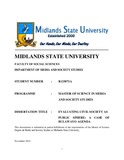Please use this identifier to cite or link to this item:
https://cris.library.msu.ac.zw//handle/11408/2185| Title: | Evaluating civil society as public sphere: a case of Bulawayo agenda. | Authors: | Jonhera, Tongai | Keywords: | Public sphere Civil society |
Issue Date: | Nov-2014 | Publisher: | Midlands State University | Abstract: | This study aims to evaluate the extent to which civil society communicative platforms can be regarded as public sphere. This study seeks to establish how civil society communicative spaces, particularly public meetings, have been used to create a public sphere in the Habermasian sense. In other words, the study sought to establish the kind of public sphere that is consummated when citizens meet and engage on issues that affect them at public meetings. The research used Bulawayo Agenda as a case study. This organization is a Bulawayo based civil society organization that focuses on democracy, governance and human rights. It uses public meetings as the main mode of engagement. The research was mainly guided Jurgen Habermas’ public sphere theory. It used questionnaires, interviews and document analysis to gather data. The research mainly used thematic and discourse analysis to analyze the data. The research noted that, Bulawayo Agenda is a communicative space that can be regarded as a public sphere platform. However, it was also noted that some elements of this communicative space are not in tandem with the Habermasian public sphere. It was also noted that, the public meetings which Bulawayo Agenda uses as the main mode of engagement still remain a vibrant and relevant, public sphere platform, despite the proliferation of new media technologies However, it was noted that Bulawayo Agenda has a number of short comings as a public sphere platform. For instance, the research noted that, the organisation has been hijacked by ‘hegemonic forces’ such as political parties, pressure groups and western donors which tend to impose their agendas on the public sphere platform. Therefore, there are a lot of changes that need to be ushered into Bulawayo Agenda’s communicative space, to make a more vibrant people’s public sphere. Having noted the need for some changes, the researcher put forward recommendations. These recommendations seek to turn Bulawayo Agenda into a more viable public sphere platform. If these recommendations are implemented Bulawayo Agenda can be transformed into a ‘Zimbabwe Agora’, a Zimbabwean version of the famous Greek Agora’ of ancient Greece. | URI: | http://hdl.handle.net/11408/2185 |
| Appears in Collections: | Master Of Science In Media And Society Studies Degree |
Files in This Item:
| File | Description | Size | Format | |
|---|---|---|---|---|
| Tongai Jonhera - Dissertation.pdf | Full text | 1.57 MB | Adobe PDF |  View/Open |
Page view(s)
216
checked on Feb 19, 2026
Download(s)
166
checked on Feb 19, 2026
Google ScholarTM
Check
Items in MSUIR are protected by copyright, with all rights reserved, unless otherwise indicated.



